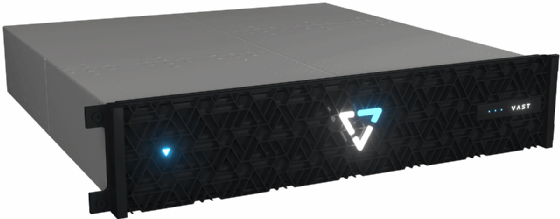
James Thew - Fotolia
Startup Vast Data: Death to disk storage
With $80 million in funding, the all-flash startup unveils its exabyte-scale Universal Storage system that it claims will make disk storage unnecessary in the data center.
Vast Data has joined the all-flash fray with its Universal Storage system, which is based on Intel persistent memory chips and consumer-grade quad-level cell NAND.
Vast Data's architecture presents file and object data in a single namespace and applies global compression with low overhead. Compression consumes only 2% to 3% of capacity, said Renen Hallak, CEO of the startup.
"We call the concept Universal Storage. You no longer need to worry about where to tier your data. We make it such that you can afford to keep all your data on one system that is fast enough for your applications, but has the cost points of an archive system," Hallak said.
The startup started selling its NVMe-over-Fabrics (NVMe-oF) storage in November. Hallak said the company has about a dozen large enterprise customers under contract, with an average selling price of more than $1 million. The list includes banks, life sciences companies, government and media, he said. However, the startup didn't make any customers available.
Vast claimed its customers commonly store petabytes of data on its systems, making it an alternative to hard-disk storage for bulk data, as well as a performance play.
"Our goal this year is to be an extinction-level event for hard disk in the data center," said Jeff Denworth, the vendor's vice president of products.
Vast Data said it has closed $80 million in two funding rounds from investors that include 83North, Goldman Sachs, Dell Technologies Capital, Norwest Venture Partners and TPG Growth.
A Vast idea: Making storage simple
Hallak said Universal Storage is intended to "disrupt the entire storage stack" and hasten the demise of hard disk drives. That's a boast expressed by other vendors in recent years. Hallak is familiar with flash storage. He was the first engineer at XtremIO, an early all-flash vendor that EMC acquired in 2012. Hallak became vice president of research and development at XtremIO and stayed at EMC until 2015.
Building all-flash storage that relies on storage class memory and NVMe-oF is both risky and potentially advantageous, said Henry Baltazar, an analyst for storage at 451 Research.
"They will have to be ahead of the curve on those two technologies if they want to disrupt the market. Storage class memory and NVMe over Fabrics are both emerging technologies, but they aren't mainstream yet," Baltazar said.
Universal Storage packages Vast Data's NVMe flash enclosure along with four C node controller heads. The 2U enclosure integrates Intel's 3D XPoint storage class memory to prolong the life of low-endurance quad-level cell (QLC) NAND SSDs.
Raw flash capacity tops out at 538 TB. The 3D XPoint dual inline memory modules serve two functions: a high-capacity write buffer and distributed metadata store. Writes are committed to 3D XPoint and, after acknowledgement, written sequentially to QLC. Data is transmitted across standard Ethernet using embedded NVMe-oF network interface cards.
Vast's enclosure is just a bunch of flash. All applications and system logic reside in Docker microservices containers on C node servers sourced from Intel. Hallak said customers can start with a single enclosure and scale a cluster up to 1,000 nodes.
Compute resources see data as direct-attached storage, Denworth said.

Global compression: Exabytes to byte level
Vast Data's erasure coding writes wide stripes of data across a cluster. Updates at the application level are written to a new location and identified by metadata pointers.
The startup claimed its global compression places data with similar retention characteristics on the same erase block. This eliminates write amplification and boosts efficiency.
"We compress an entire exabyte-size namespace down to byte-level granularity. If we have to recover a single failed drive, only a small piece needs to be decoded," Hallak said.
Vast Data didn't disclose pricing for Universal Storage. Denworth said each deployment is sized according to a customer's compute and storage needs.
"We have a variety of scenarios where you could pay less than 10 cents [per gigabyte] for NVMe flash," he said.
Most customers are likely to purchase Universal Storage as an appliance, with integrated servers, storage and switching. Vast Data also enables customers to run their own container software on C nodes. A software-only version is available to customers with at least 100 PB.
Vast Data is headquartered in New York City, with operations and a support center in San Jose, Calif. Ex-Kaminaro CTO Shachar Fienblit heads Vast Data's research and development. Operations Vice President Avery Pham has led product operations at DataDirect Networks and, more recently, at Pure Storage. Denworth was senior vice president of marketing at Ctera Networks and DataDirect Networks before joining Vast Data.








